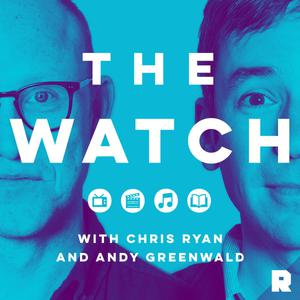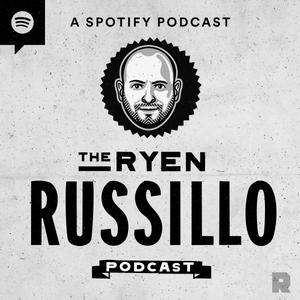
Plain English with Derek Thompson
The Ringer
- 59 minutes 34 secondsAre Flying Cars Finally Here?
For decades, flying cars have been a symbol of collective disappointment—of a technologically splendid future that was promised but never delivered. Whose fault is that?
Gideon Lewis-Kraus, a staff writer at The New Yorker who has spent 18 months researching the history, present, and future of flying car technology, joins the show. We talk about why flying cars don't exist—and why they might be much closer to reality than most people think.
If you have questions, observations, or ideas for future episodes, email us at [email protected].
Host: Derek Thompson
Guest: Gideon Lewis-Kraus
Producer: Devon Baroldi
Learn more about your ad choices. Visit podcastchoices.com/adchoices
7 May 2024, 10:00 am - 56 minutes 57 secondsHow the Logic of Cults Is Taking Over Modern Life
Several years ago, I told some friends that I had an idea for a second book. It would be called ‘Everything Is a Cult.’ I’d noticed that in an age of declining religiosity, capitalism was filling the god-shaped hole left by the demise of organized religion with companies and services and products that were amassing a cult-like following in media, entertainment, and marketing. I never ended up writing the book. But last week, Sean Illing of ‘The Gray Area’ podcast with Vox asked me to come on his show to talk about my thinking on cults, identity, and the history of news media. Today, we're running that conversation on this feed in a rare example of me getting interviewed on my own show. Enjoy!
If you have questions, observations, or ideas for future episodes, email us at [email protected].
Host: Derek Thompson
Guest: Sean Illing
Producer: Devon Baroldi
Learn more about your ad choices. Visit podcastchoices.com/adchoices
3 May 2024, 10:00 am - 42 minutes 21 secondsHow Will the Gaza War Finally End?
Today, with Gaza protests spreading across the country and around the world, we dive deep into what’s actually happening on the ground in the war between Israel and Hamas—and how this war might actually end, or lead to a broader conflict.
The status quo in Gaza is horrendous in every conceivable way. Following an attack that killed more than a thousand Israelis on October 7, Israel has retaliated with a bombing campaign more destructive than the most aggressive World War II fire-bombings in Germany. 80 percent of buildings in north Gaza have been damaged or destroyed. Tens of thousands of Gaza civilians have been killed, according to various estimates. Millions are displaced and hungry, and many are camped near Rafah, where Israel is considering a new military campaign to root out Hamas leaders.
Today’s guest is Natan Sachs, the director of the Center for Middle East Policy at Brookings. I asked Natan to come back on the show because, while the entire media is covering the campus protests in excruciating detail, I felt like the news cycle was losing its grip on the actual war itself. Today, I asked Natan my biggest questions about the war as it stands, including whether Israel’s military strategy has already failed; whether Hamas’s top leadership actually wants the kind of ceasefire that campus protesters are calling for; and whether anything about this war would actually change if the U.S. immediately halted military aid to Israel.
If you have questions, observations, or ideas for future episodes, email us at [email protected].
Host: Derek Thompson
Guest: Natan Sachs
Producer: Devon Baroldi
Learn more about your ad choices. Visit podcastchoices.com/adchoices
30 April 2024, 10:00 am - 55 minutes 8 secondsA Political Scientist on How Protests Can Change Minds or Backfire
In the last week, hundreds of protests across college campuses and American cities have taken place in response to the war in Gaza. Campus life has shut down at Columbia University in NYC. The news is strewn with images of police confrontations on campuses, from Texas to California. Hundreds of demonstrators across the country have been taken into police custody. And many people now anticipate that, without a major course correction in the war in Gaza, demonstrators will converge on the Democratic National Convention in Chicago, in a replay of the infamous 1968 anti-war protests and police riots that defined that national convention. Next week, we’re going to have a full episode on the war itself. Today, I want to talk about the nature of protest itself. Omar Wasow, a professor of political science at UC Berkeley, is the author of an influential paper about the history of 1960s protests. Today we talk about what made the 1960s protests different, how protests succeed, how protests backfire, and how his research applies to today.
If you have questions, observations, or ideas for future episodes, email us at [email protected].
Host: Derek Thompson
Guest: Omar Wasow
Producer: Devon Baroldi
LINKS: "Agenda Seeding: How 1960s Black Protests Moved Elites, Public Opinion, and Voting" [link]
Learn more about your ad choices. Visit podcastchoices.com/adchoices
26 April 2024, 10:00 am - 1 hour 10 secondsWhat Kind of a Superpower Is India Becoming?
Today’s episode is all about India.You don’t have to believe that demography is pure destiny to appreciate the fact that the future of India is the future of the world. In 2024, today, India is the largest country by population on the planet, having surpassed China two years ago. In 2050, India is still projected to be the largest country in the world. In 2100, when I am 114 years old and this podcast is hosted by my cryo-frozen vat brain, India's projected to be larger than the next two biggest countries combined: China and Nigeria.
This spring, nearly one billion Indians are eligible to vote in India's election, and the big winner is almost certain—the highly popular and highly controversial Prime Minister Narendra Modi. What kind of a country is India becoming under Modi? Ravi Agrawal, the editor-in-chief of Foreign Policy magazine, joins us to discuss.
If you have questions, observations, or ideas for future episodes, email us at [email protected].
Host: Derek Thompson
Guest: Ravi Agrawal
Producer: Devon Baroldi
Learn more about your ad choices. Visit podcastchoices.com/adchoices
23 April 2024, 10:00 am - 1 hour 7 secondsHealth Fads and Fictions: VO2 Max, Supplement Mania, Sunlight, and Immortality
Today's show is a critical look at some of the most popular health fads of the moment, with return guests Steve Magness and Brad Stulberg, from the Growth Equation and the ‘FAREWELL’ podcast. We’re talking VO2 max, the benefits of sunlight, so-called morning and nighttime “stacks” (complex multivitamin routines for optimizing your energy and sleep), and Silicon Valley dreams of immortality. Plus, a rant from Derek about the supplement mania of independent media.
If you have questions, observations, or ideas for future episodes, email us at [email protected].
Host: Derek Thompson
Guests: Steve Magness & Brad Stulberg
Producer: Devon Baroldi
Links:
The ‘FAREWELL’ podcast: https://thegrowtheq.com/farewell-podcast/
The FDA's note on dietary supplement regulation: https://www.fda.gov/news-events/rumor-control/facts-about-dietary-supplements
Joe Rogan's supplement stack: https://jrelibrary.com/articles/joe-rogans-supplement-stack/
Huberman's sleep stack: https://www.nsdr.co/post/andrew-hubermans-sleep-cocktail
The Mayo Clinic on creatine: https://www.mayoclinic.org/drugs-supplements-creatine/art-20347591
Learn more about your ad choices. Visit podcastchoices.com/adchoices
19 April 2024, 10:00 am - 47 minutes 27 secondsU.S. Economy FAQ: Skyrocketing Insurance Prices, Stuck Inflation, Higher Rates, and Wrong Experts
Jason Furman, a professor of economics at Harvard, returns to the show to discuss the biggest economic questions of the moment, including:
- Why have home and auto insurance prices skyrocketed?
- Why did inflation stop falling in 2024?
- How did economic experts get their disinflation forecasts so wrong?
- What sticky-high prices are preventing further disinflation?
- Are interest rates going to be higher for years?
If you have questions, observations, or ideas for future episodes, email us at [email protected].
Host: Derek Thompson
Guest: Jason Furman
Producer: Devon Baroldi
Learn more about your ad choices. Visit podcastchoices.com/adchoices
16 April 2024, 10:00 am - 50 minutes 45 secondsIf the 2024 Election Is So Important, Why Does It Feel So Boring?
"This presidential election is not very interesting, but it is important," the political commentator Josh Barro wrote in his newsletter, 'Very Serious.' Americans certainly seem to agree with the first part. Engagement with political news has been in the dumps, and many Americans seem to be tuning out the Biden-Trump II rematch. But the conundrum of this election is that it is both numbingly overfamiliar for many voters and also profoundly important for America and the world. The differences between a Biden and a Trump presidency for America’s domestic and foreign policy are huge. Too often, these differences are ignored in horse-race coverage—and, sometimes, they even go underemphasized by the campaigns and their own advocates. If you turn on a news segment or read a long article, you’ll probably hear about the dangers that Trump poses to democracy, or the rule of law, or the administrative state. All worthy concerns. But what is at stake for our most basic bread-and-butter issues: abortion, inflation, economic growth, government spending, entitlements, immigration, and foreign policy? Josh and Derek talk about the roots of voter ambivalence, what Trump's second administration could look like, and the biggest differences between a Biden and Trump White House.
If you have questions, observations, or ideas for future episodes, email us at [email protected].
Host: Derek Thompson
Guest: Josh Barro
Producer: Devon Manze
Learn more about your ad choices. Visit podcastchoices.com/adchoices
12 April 2024, 10:00 am - 53 minutes 31 secondsA Psychologist Explains Four Reasons the Internet Feels So Broken
Jay Van Bavel is a professor of psychology and neural science at New York University. His lab has published papers on how the internet became a fun-house mirror of extreme political opinions, why the news media has a strong negativity bias, why certain emotions go viral online, why tribalism is inflamed by online activity, and how the internet can make us seem like the worst versions of ourselves. At the same time, Van Bavel emphasizes that many of the group psychology dynamics that can make social media seem like a dumpster fire are also core to what makes humankind such a special and ingenious species. We discuss the four dark laws of online engagement and the basics of group psychology.
If you have questions, observations, or ideas for future episodes, email us at [email protected].
Host: Derek Thompson
Guest: Jay Van Bavel
Producer: Devon Baroldi
Learn more about your ad choices. Visit podcastchoices.com/adchoices
9 April 2024, 10:00 am - 43 minutes 29 secondsWhy School Absences Have "Exploded" Across America
The other day, I read a statistic about my hometown of Washington D.C. that knocked my socks off. In D.C. high schools, 60 percent of students were chronically absent in the last school year. That means they missed one day of school every two weeks. Among ninth graders, it’s even worse: One-third of D.C. freshmen were absent for the equivalent of six weeks of school.
The New York Times reported that, nationwide, one quarter of public school students are now chronically absent. That figure has practically doubled since before the pandemic. And it’s doubled across all sorts of districts—rich and poor, liberal and conservative. Today’s guest is Nat Malkus, a former teacher who is the deputy director of education policy at the American Enterprise Institute. We talk about why school absences have exploded across the country; why some people think this just doesn’t matter; why we think it might matter quite a bit; and what teachers, parents, and lawmakers should do about it.
Host: Derek Thompson
Guest: Nat Malkus
Producer: Devon Renaldo
Learn more about your ad choices. Visit podcastchoices.com/adchoices
5 April 2024, 10:00 am - 51 minutes 52 secondsWhat Evolutionary Biology Can Teach Us About Diet, Exercise, and Staying Alive
What can the science of ancient humans and the lifestyle of hunter-gatherers teach us about how to be healthy today? Harvard evolutionary biologist Daniel Lieberman joins the show to talk about his provocative “mismatch theory,” why humans are dysevolved for the modern world, and why exercise is the ultimate miracle drug.
Host: Derek Thompson
Guest: Daniel Lieberman
Producer: Devon Renaldo
Links:
Exercised, by Dan Lieberman https://www.amazon.com/dp/B082H3ZH44?ref=KC_GS_GB_US
The Story of the Human Body, by Dan Lieberman https://www.amazon.com/Story-Human-Body-Evolution-Disease/dp/030774180X
Learn more about your ad choices. Visit podcastchoices.com/adchoices
2 April 2024, 10:00 am - More Episodes? Get the App
Your feedback is valuable to us. Should you encounter any bugs, glitches, lack of functionality or other problems, please email us on [email protected] or join Moon.FM Telegram Group where you can talk directly to the dev team who are happy to answer any queries.
 The Bill Simmons Podcast
The Bill Simmons Podcast
 The Press Box
The Press Box
 The Ringer NBA Show
The Ringer NBA Show
 The Watch
The Watch
 The Rewatchables
The Rewatchables
 The Ryen Russillo Podcast
The Ryen Russillo Podcast